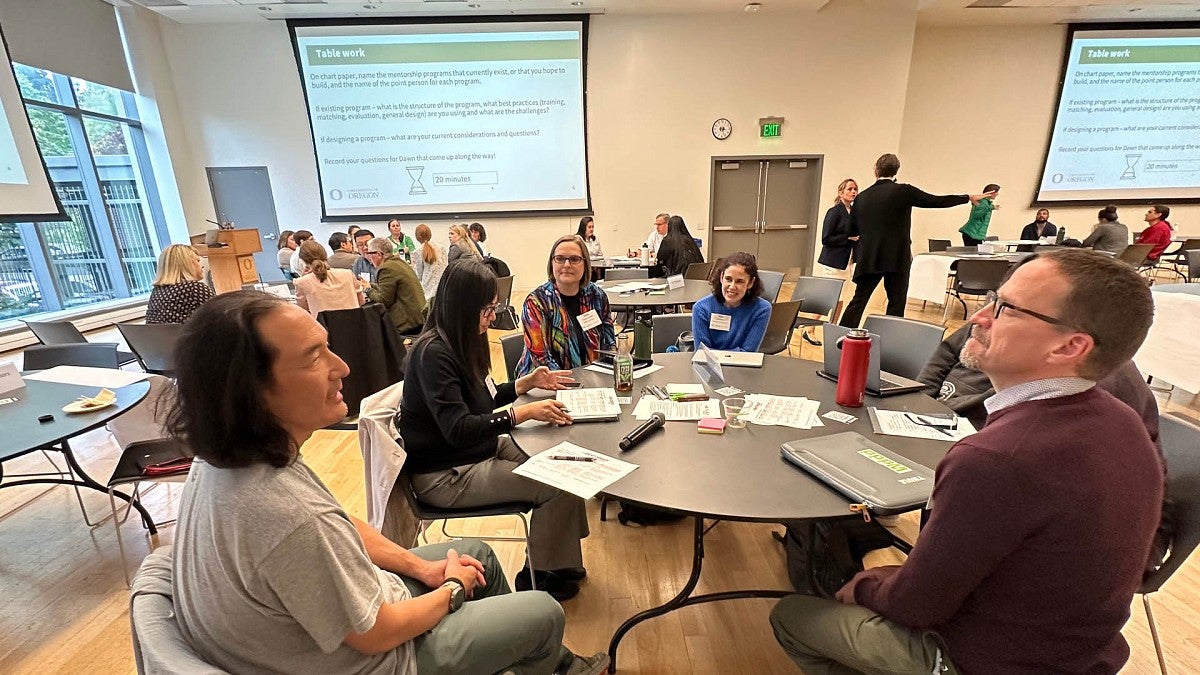Everyone at the University of Oregon — undergraduate students, graduate students, postdoctoral fellows, faculty and staff — deserves a mentorship network, and such networks don’t happen by accident.
Those are the guiding principles behind UO Mentorship Reimagined, a yearlong series of events led by the Office of the Provost and campus partners that includes guest speakers, panel discussions, workshops, resources and communications, all aimed at developing a culture of mentorship at the UO.
“There is so much evidence to support high-quality mentorship that is network-based, reciprocal, adaptive and responsive,” said Sierra Dawson, associate vice provost for faculty and leadership development. “It makes such a difference to people as they move through their careers.”
A pair of workshops are scheduled for Nov. 6 and 9. One is focused on being a mentor, and the other is how to build a mentorship network as a mentee. Learn more and register for the workshops on the provost’s website .
Instead of limiting mentorship to a single formal or assigned mentor, UO Mentorship Reimagined is adopting a network-based approach in which people build their own mentorship networks with a variety of relationships and interactions. Some will be formal, but most are informal. Some may be long-term relationships, but most are short-term.
For example, some people might think about developing a network based on their goals and the specific moment in their career and intentionally seek out a role model or someone who is farther along in their career who can be a sponsor or help them learn and grow, Dawson said.
At the same time, a person can be a mentor to others, serving as a coach, sounding board and resource, answering questions for someone who wants to learn and grow.
“What we’re trying to do is build a culture where people are using that lens and thinking it through in that way,” Dawson said. “Thinking about how I could be intentional about who I create relationships with, so they help me to learn and meet my goals wherever I am in my career.”
Some structured mentorship programs already exist, and the provost’s office, by leading and bringing together collaborators from around campus, can be a central hub. In addition, communities of practice are being developed to support the development of additional structured mentorship opportunities.
Dawson said it’s important to view mentorship networks through the lens of inclusion, to ensure that mentors are available to people of different backgrounds, identities and career goals. If mentorship is not intentional it can be inequitably distributed, and some people may not benefit, she said.
“We’re trying to remind ourselves that we all deserve that access, and, importantly, we can develop our agency to create our own networks,” she said.
Part of that is reminding people they don’t have to ask someone to be their mentor.
“What you can say is, ‘Gosh, your career looks like it’s really interesting. Can I take you out for a cup of coffee and just ask you questions about your life?’ Most people say yes to that because we like talking about ourselves,” Dawson said. “We’re helping people to see how they can access other people in ways that are less intimidating or less formal so that we can actually create some really great mentorship relationships and use our own agency.”
—Top photo: UO staff and faculty work collaboratively at the Mentorship Program Development session of the UO Mentorship Reimagined kickoff and keynote event.


